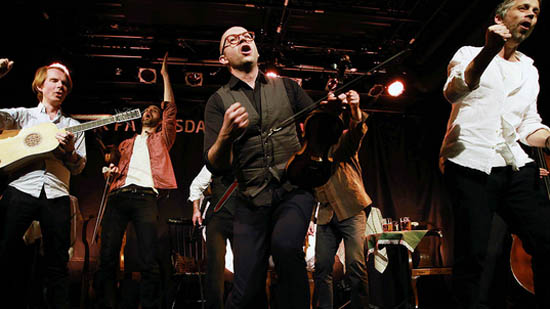|
Passing Around the Grog: The Alehouse Sessions in Studio and in Concert
The Alehouse Sessions is a piece of history unearthed and mantled for new ears. Indeed, Norwegian violinist Bjarte Eike's fascinating project doesn't so much transport us back to the past as reposition the past in the here and now, when its lessons are more poignant than ever. Backed by his Alehouse Boys, a merry band culled from the Barokksolistene ensemble Eike leads, the project's latest CD is a sonic re-creation of 17th-century English taverns. At the time, Puritans had closed theaters under cloak of moral guardianship, in the process displacing highly trained musicians into the alternate reality of the tavern, where they filled the air with intoxicating sounds as patrons intoxicated themselves. Although Charles II would lift the ban, by then tavern music had grown into something of a genre, in which the vagaries of quotidian life rubbed elbows with mythologies in the making.
A portion of the album's repertoire comes to us by way of "The English Dancer," a compendium of country dances from which the band assembles a heady flight that includes the lager of “Wallom Green” and the maltier “The Virgin Queen Set.” There is a busking verve and jangle pop quality to these arrangements, each a study in dynamism and invigoration. Other morsels, such as “Curtain Tune” (incidental music for Shakespeare's "Timon of Athens") and “Lead Me” (set by Henry Purcell for a production of "Bonduca") are plucked from the Jacobean tree. The latter tune is carried magnificently by singer Thomas Guthrie, whose approach to lyric is informed by his own love of theater, and makes its presence felt in a smattering of standalone ditties, elegies, and sea shanties. And no such program would be complete without the Padstow gem “Pass Around the Grog,” a song so quintessential that it practically smells of inebriated camaraderie.
That balances of bawdiness and reflections are the group's forte was obvious during their first stateside performance on 11 October 2017 at New York City's SubCulture. Venue-provided beer in hand, they shared a toast with the audience before diving into a flow so evocative that “atmospheric” barely does justice to describing its escapist power. Eike and friends worked the stage like a knotted muscle into relaxation, proving at every turn that their brand of spontaneity could only be born of fierce training. They also brought great humor to their presentation, interrupting their opening number, for instance, to play out a drunken brawl in slow motion. This was immediately followed by a version of Purcell's “Lead Me” that was even more resolutely alive than the album version. This was, perhaps, the greatest pleasure of seeing the Alehouse Boys in the flesh, by which the rigor and body work that goes into such a performance came across with unique authenticity. In this sense, Guthrie was in top form. Whether turning down the lights in his inflection of the Anglo-Scottish border ballad “Lord Randall” or sharing a gender-bending duet with Per T Buhre as Corydon and Mopsa from Purcell's "The Fairy-Queen," he brought out the vocal qualities of the other players, just as they coaxed instrumental qualities from within himself.
Every musician brought a cornucopia of delights to the table. There was the percussive backbone of Fredrik Bock on charango and the dancing of Steven Player, the equally rhythmic core of Buhre and Guthrie on their backing strings, the lively bassing of Johannes Lundberg, the rustic vivacity of viol(in)ist Milos Valent, and the harmonium of Hans Knut Sveen. They were all singers as well, bringing Beach Boys-esque depth to the occasional a capella aside.
Eike was a beacon of focus throughout, linking his ensemble into a chain of artful exchanges, comic interludes, and audience rapport. The energy flying from his bow was an inspiration, and spoke to the credence of his seamless integration of geographies. Case in point was the “Travel Set,” which cycled through tunes from Norway, Scotland, Denmark, Shetland, and a jovial take on “The MTA Song” with ease. Like the “Spanish Set” with which the group encored, during which Eike walked through the crowd with his violin, it was a reminder that listening is an active process.
By evening's end, I found myself pondering the prohibitions that led to this fountainhead of creativity, and couldn't help but reflect on the current landscape of political lockdowns, scandals, and hypocrisies. These “Alehouse Sessions,” in both recorded and live form, are exemplary in their ability to melt the cages of censorship into tenderer weapons of humanity. Here is music that asserts itself as a commodity only of the heart, fermented with just the right amount of personal expression it until it goes down smoothly like a pint ripe for the palate.
|
